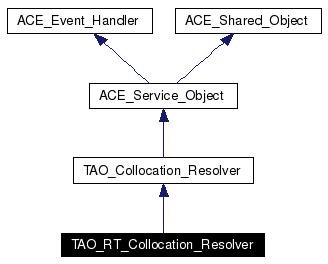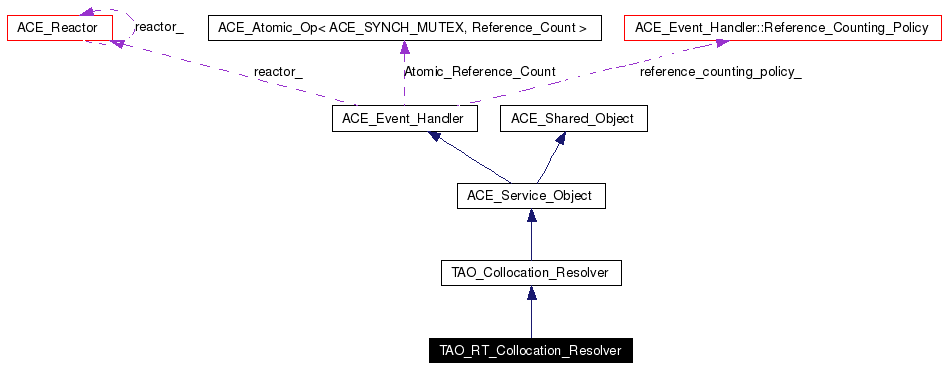
#include <RT_Collocation_Resolver.h>
Inheritance diagram for TAO_RT_Collocation_Resolver:


Public Member Functions | |
| virtual CORBA::Boolean | is_collocated (CORBA::Object_ptr object) const |
| Is object collocated? | |
Definition at line 41 of file RT_Collocation_Resolver.h.
|
|
Is object collocated? Get the ORB_Core's TSS resources. Implements TAO_Collocation_Resolver. Definition at line 23 of file RT_Collocation_Resolver.cpp. References TAO_ORB_Core::get_tss_resources(), TAO_ORB_Core_TSS_Resources::lane_, and TAO_Thread_Pool.
00024 {
00025 // Make sure that the servant is in the same ORB that created this
00026 // object.
00027 if (!object->_is_collocated ())
00028 return false;
00029
00030 // Get the orb core.
00031 TAO_ORB_Core *orb_core = object->_stubobj ()->servant_orb_var ()->orb_core ();
00032
00033 // Lookup the target POA. Note that Object Adapter lock is held
00034 // until <servant_upcall> dies.
00035 TAO::Portable_Server::Servant_Upcall servant_upcall (orb_core);
00036 TAO_Root_POA *poa =
00037 servant_upcall.lookup_POA (object->_stubobj ()->object_key ());
00038
00039 // Get the thread pool associated with this POA.
00040 TAO_Thread_Pool *target_thread_pool =
00041 static_cast <TAO_Thread_Pool *> (poa->thread_pool ());
00042
00043 // If the target POA does not have a dedicated thread pool, then all
00044 // calls to it are collocated.
00045 if (target_thread_pool == 0)
00046 return true;
00047
00048 /// Get the ORB_Core's TSS resources.
00049 TAO_ORB_Core_TSS_Resources &tss =
00050 *orb_core->get_tss_resources ();
00051
00052 // Get the lane for this thread.
00053 TAO_Thread_Lane *current_thread_lane =
00054 static_cast <TAO_Thread_Lane *> (tss.lane_);
00055
00056 TAO_Thread_Pool *current_thread_pool = 0;
00057
00058 // If we don't have a lane, we don't have a pool.
00059 if (current_thread_lane)
00060 current_thread_pool =
00061 ¤t_thread_lane->pool ();
00062
00063 // If the pools don't match, then the current thread belongs to a
00064 // different pool than POA. Therefore, this object is not
00065 // collocated.
00066 if (current_thread_pool != target_thread_pool)
00067 return false;
00068
00069 // If the current thread and the POA are in the default thread pool,
00070 // then the object is collocated.
00071 if (current_thread_pool == 0)
00072 return true;
00073
00074 // If the current thread and the POA are in a thread pool without
00075 // lanes, then the object is collocated.
00076 if (!current_thread_pool->with_lanes ())
00077 return true;
00078
00079 // Grab the priority model used by the POA. Note that this cannot
00080 // be NOT_SPECIFIED because NOT_SPECIFIED is not allowed with thread
00081 // pool with lanes.
00082 TAO::Portable_Server::Cached_Policies::PriorityModel priority_model =
00083 poa->priority_model ();
00084
00085 // If the policy is CLIENT_PROPAGATED, then we are collocated
00086 // because the current thread is of the correct priority :-) and
00087 // we'll simple use the current thread to run the upcall.
00088 if (priority_model == TAO::Portable_Server::Cached_Policies::CLIENT_PROPAGATED)
00089 return true;
00090
00091 // Find the target servant priority. We are really not interested in the
00092 // servant itself but in the priority that this servant will run at.
00093 CORBA::Short target_priority;
00094
00095 if (-1 == poa->find_servant_priority (servant_upcall.system_id_,
00096 target_priority))
00097 {
00098 return false;
00099 }
00100
00101 // If it matches the current thread's priority, then we are
00102 // collocated. Otherwise we are not.
00103 if (target_priority == current_thread_lane->lane_priority ())
00104 return true;
00105 else
00106 return false;
00107 }
|
 1.3.6
1.3.6